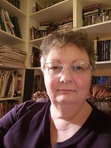Lorina Stephens's Blog, page 49
September 6, 2013
Steve Stanton reviews Immunity to Strange Tales, by Susan Forest
Steven Stanton, author and president of SFCanada, reviewed Susan Forest's collection of short speculative fiction on Goodreads. It would appear Stanton was impressed.
Steve Stanton's Reviews > Immunity to Strange Tales

Read

My rating:
1 of 5 stars2 of 5 stars3 of 5 stars4 of 5 stars[ 5 of 5 stars ]
Immunity to Strange Tales
by Susan Forest

Steve Stanton's review
Sep 04, 13
Immunity to Strange Tales is a superb premier collection of short science fiction and fantasy by Canadian author Susan Forest. These intriguing stories are varied in voice and style, spanning years of literary experimentation by the author, and most are told with delightful sophistication.
like ∙ flag

Steve Stanton's Reviews > Immunity to Strange Tales

Read

My rating:
1 of 5 stars2 of 5 stars3 of 5 stars4 of 5 stars[ 5 of 5 stars ]
Immunity to Strange Tales
by Susan Forest

Steve Stanton's review
Sep 04, 13
Immunity to Strange Tales is a superb premier collection of short science fiction and fantasy by Canadian author Susan Forest. These intriguing stories are varied in voice and style, spanning years of literary experimentation by the author, and most are told with delightful sophistication.
like ∙ flag

Published on September 06, 2013 03:00
September 4, 2013
Why we published: Mik Murdoch: Boy Superhero, by Michell Plested
One of the joys of running a small publishing house is the ability you have to access unknown authors with that gem of a manuscript. It isn't an every day occurrence, but I'd have to say it's happy circumstance that Five Rivers has had an embarrassment of riches from debut authors.
Such was the case when Michell Plested first approached us in 2010 with a story about a young boy determined to be the guardian of his Alberta town of Cranberry Flats. That first submission demonstrated a promising writer with a promising story, but one which didn't quite hit the bar, so we sent Plested back a detailed critique and encouragement to resubmit when he'd worked out the kinks.
And so he did. That second iteration we received clearly indicated a writer willing to hone his craft, to take constructive criticism and run with it, and we were impressed enough with how well he'd developed the story we offered him a publishing contract for Mik Murdoch: Boy Superhero, and the subsequent sequels.
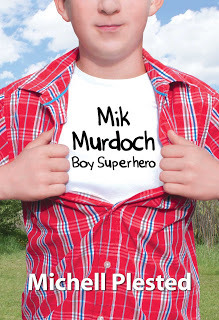
What was it about the story that captured our hearts? There was something reminiscent of W.O. Mitchell's work in Plested's story, and yet this wasn't just a coming of age story about a boy growing up on the prairie. There were elements of many boys' comic book dreams, of attaining super-powers and shouldering grim responsibility in the face of impossible odds. Yet neither was this a dark journey into the loss of innocence and sacrificial battles. Quite otherwise, Plested revealed both a tenderness and humour in Mik Murdoch's escapades that had many of us either in tears of joy, or tears of sympathy.
Quite simply, Plested crafted great characters in a great story, using simple and spare language, no frills and absolute honesty.
And what publisher would turn their back on that?
So we didn't. And in August of 2012 we were thrilled to launch this debut YA fantasy at When Words Collide.
Plested has gone on to garner quite a following of fans who cross all genders, ages and borders. And all of us, from publisher to fans, eagerly await the second installment which is due to hit our In Box some time in the next few weeks.
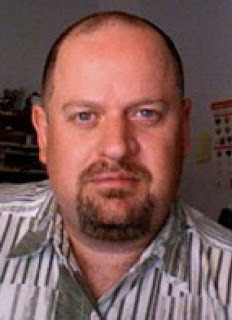
Michell Plested

Such was the case when Michell Plested first approached us in 2010 with a story about a young boy determined to be the guardian of his Alberta town of Cranberry Flats. That first submission demonstrated a promising writer with a promising story, but one which didn't quite hit the bar, so we sent Plested back a detailed critique and encouragement to resubmit when he'd worked out the kinks.
And so he did. That second iteration we received clearly indicated a writer willing to hone his craft, to take constructive criticism and run with it, and we were impressed enough with how well he'd developed the story we offered him a publishing contract for Mik Murdoch: Boy Superhero, and the subsequent sequels.

What was it about the story that captured our hearts? There was something reminiscent of W.O. Mitchell's work in Plested's story, and yet this wasn't just a coming of age story about a boy growing up on the prairie. There were elements of many boys' comic book dreams, of attaining super-powers and shouldering grim responsibility in the face of impossible odds. Yet neither was this a dark journey into the loss of innocence and sacrificial battles. Quite otherwise, Plested revealed both a tenderness and humour in Mik Murdoch's escapades that had many of us either in tears of joy, or tears of sympathy.
Quite simply, Plested crafted great characters in a great story, using simple and spare language, no frills and absolute honesty.
And what publisher would turn their back on that?
So we didn't. And in August of 2012 we were thrilled to launch this debut YA fantasy at When Words Collide.
Plested has gone on to garner quite a following of fans who cross all genders, ages and borders. And all of us, from publisher to fans, eagerly await the second installment which is due to hit our In Box some time in the next few weeks.

Michell Plested

Published on September 04, 2013 02:46
September 1, 2013
Why We Published...Susan Forest's Immunity to Strange Tales
From the Desk of Robert Runte
I try to keep on top of developments in the Canadian SF community, and had noticed that Susan Forest was being published in the major short story markets: Analog, Tesseracts, AE Science Fiction Review and so on. Then she won first place in The Galaxy Project a major contest judged by Robert Silverberg, David Drake and Barry Malzberg. That certainly got my attention. Even though I hadn't had a chance to read her work myself, that was enough to suggest she might be someone we would be interested in approaching.
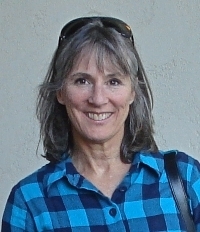
Susan Forest
The difficulty, of course, is finding the time to read anything that isn't already sitting in my "in" basket. I am not about to make an offer on a book I haven't read, so had to find some way of sitting down and assessing whether I actually liked Susan's writing. I was therefore delighted to discover that she was scheduled to read from her work at the first When Words Collide conference (Calgary, Alberta). Here was my chance to hear first hand whether Susan Forest was an author I wanted for Five Rivers.
After hearing her read her latest story (which was brilliant: funny and clever), I knew that she was. She also presented well, which is important because publishers are looking for authors who can interview well, who can be counted on to act professionally, and so on. In other words, someone we could work with. I approached her immediately after her reading to ask if she'd consider a collection of her short stories.
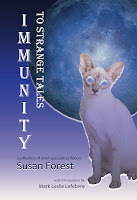
She was, I think, somewhat taken aback because she knew (everybody knows) short story collections don't sell. But at Five Rivers we take a longer view, and knew that when Susan finally finished her novel, readers would want to read more by her, and having a conveniently packaged collection available would be more attractive than tracking down individual stories in back issues of various magazines. And we believe in developing writers, so identifying and promoting authors before they become huge is part of what we do. (Of course, we hope that they will choose to become huge with us.)
So the moral of this story is: do not hesitate to do public readings if you have published stories to read. There were, I recall, fewer than half a dozen others in attendance at Susan's reading, but quality, not quantity is what's important in an audience: you never know who is listening and who might be an editor, an agent, a publisher, a reviewer, or just someone who has the ear of one of those.
Or, alternatively, the moral is that you sell your novel by building your reputation in short story markets.

I try to keep on top of developments in the Canadian SF community, and had noticed that Susan Forest was being published in the major short story markets: Analog, Tesseracts, AE Science Fiction Review and so on. Then she won first place in The Galaxy Project a major contest judged by Robert Silverberg, David Drake and Barry Malzberg. That certainly got my attention. Even though I hadn't had a chance to read her work myself, that was enough to suggest she might be someone we would be interested in approaching.

Susan Forest
The difficulty, of course, is finding the time to read anything that isn't already sitting in my "in" basket. I am not about to make an offer on a book I haven't read, so had to find some way of sitting down and assessing whether I actually liked Susan's writing. I was therefore delighted to discover that she was scheduled to read from her work at the first When Words Collide conference (Calgary, Alberta). Here was my chance to hear first hand whether Susan Forest was an author I wanted for Five Rivers.
After hearing her read her latest story (which was brilliant: funny and clever), I knew that she was. She also presented well, which is important because publishers are looking for authors who can interview well, who can be counted on to act professionally, and so on. In other words, someone we could work with. I approached her immediately after her reading to ask if she'd consider a collection of her short stories.

She was, I think, somewhat taken aback because she knew (everybody knows) short story collections don't sell. But at Five Rivers we take a longer view, and knew that when Susan finally finished her novel, readers would want to read more by her, and having a conveniently packaged collection available would be more attractive than tracking down individual stories in back issues of various magazines. And we believe in developing writers, so identifying and promoting authors before they become huge is part of what we do. (Of course, we hope that they will choose to become huge with us.)
So the moral of this story is: do not hesitate to do public readings if you have published stories to read. There were, I recall, fewer than half a dozen others in attendance at Susan's reading, but quality, not quantity is what's important in an audience: you never know who is listening and who might be an editor, an agent, a publisher, a reviewer, or just someone who has the ear of one of those.
Or, alternatively, the moral is that you sell your novel by building your reputation in short story markets.

Published on September 01, 2013 21:19
August 29, 2013
Why We Published...North By 2000+, by H. A. Hargreaves
From the desk of Robert Runte
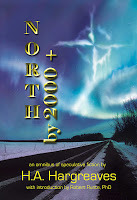
I first heard Dr. Hargreaves read Dead to the World in 1976 just before North by 2000 was published.
The story was funny and thought provoking and was something of a revelation, because it was the first time I was able to pinpoint what it was about Canadian SF that was different. North by 2000 was the first short story collection ever marketed as Canadian Science Fiction, and it had a profound influence on my SF criticism and my own fiction writing. For the next 30 years, I used examples from North by 2000 whenever I gave lectures on Canadian SF. The audiences loved it, because Hargreave's themes and conclusions resonate with Canadians, and because his stories are so clearly different from the American version of the genre.
But then, one day, an audience member came up to me after one of my talks to ask where she could get a copy of the book. I conceded that the book had been out of print for over 30 years. Even most libraries didn't have copies any more, because libraries prune their collections every decade or so. Short of me lending her my own copy, I had no idea where she could find one, let alone obtain a class set for her high school SF course.
"Which is a shame," I said, "because the stories are still as relevant today as they ever were. After all these years, after all the thousands of stories I have read in between, these are still the stories that keep coming back to me. True Canadian Classics."
I probably would have gone on at some length about how North by 2000 should be included on the list of approved books for the Language Arts curriculum, but she was looking at me funny.
She poked her finger in the general direction of my chest and said, "But didn't your bio say that you were a senior editor at a publishing house? You need to reprint it."
And I said,"....uh, yeah. Okay."
Don't know why hadn't thought of that before, but that was the beginning of our Canadian SF reprint series. When I showed Lorina the book, she loved it. We decided to expand the collection by including all the stories Hargreaves had published since, so we could offer his complete SF canon as North by 2000+. When I phoned Hargreaves with our proposal he readily agreed, and told us the original title had actually been North by 2000+ but that the original publisher had dropped the + sign. Seemed like a good omen!
I also took the opportunity to write an Introduction and Afterword, explaining why I think the collection is so memorable, significant. And by extension, why Canadian SF resonates with Canadian readers at a level that other mass market SF cannot.
Bottom line: We published North by 2000+ because it is my favorite SF collection of all time.


I first heard Dr. Hargreaves read Dead to the World in 1976 just before North by 2000 was published.
The story was funny and thought provoking and was something of a revelation, because it was the first time I was able to pinpoint what it was about Canadian SF that was different. North by 2000 was the first short story collection ever marketed as Canadian Science Fiction, and it had a profound influence on my SF criticism and my own fiction writing. For the next 30 years, I used examples from North by 2000 whenever I gave lectures on Canadian SF. The audiences loved it, because Hargreave's themes and conclusions resonate with Canadians, and because his stories are so clearly different from the American version of the genre.
But then, one day, an audience member came up to me after one of my talks to ask where she could get a copy of the book. I conceded that the book had been out of print for over 30 years. Even most libraries didn't have copies any more, because libraries prune their collections every decade or so. Short of me lending her my own copy, I had no idea where she could find one, let alone obtain a class set for her high school SF course.
"Which is a shame," I said, "because the stories are still as relevant today as they ever were. After all these years, after all the thousands of stories I have read in between, these are still the stories that keep coming back to me. True Canadian Classics."
I probably would have gone on at some length about how North by 2000 should be included on the list of approved books for the Language Arts curriculum, but she was looking at me funny.
She poked her finger in the general direction of my chest and said, "But didn't your bio say that you were a senior editor at a publishing house? You need to reprint it."
And I said,"....uh, yeah. Okay."
Don't know why hadn't thought of that before, but that was the beginning of our Canadian SF reprint series. When I showed Lorina the book, she loved it. We decided to expand the collection by including all the stories Hargreaves had published since, so we could offer his complete SF canon as North by 2000+. When I phoned Hargreaves with our proposal he readily agreed, and told us the original title had actually been North by 2000+ but that the original publisher had dropped the + sign. Seemed like a good omen!
I also took the opportunity to write an Introduction and Afterword, explaining why I think the collection is so memorable, significant. And by extension, why Canadian SF resonates with Canadian readers at a level that other mass market SF cannot.
Bottom line: We published North by 2000+ because it is my favorite SF collection of all time.

Published on August 29, 2013 03:55
August 26, 2013
Why We Published: The Books of 2011
By the time 2011 rolled around we were really beginning to ramp up. Robert Runte had joined us as Senior Editor (also known as Wing-Man), and with him he brought an entirely new perspective and invaluable skills. It was under his editorial guidance we released The Organic Home Garden, by Patrick Lima and John Scanlan.
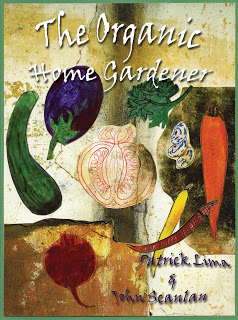
Patrick Lima approached me late in 2010, wondering if I'd be interested in publishing a revised version of his orphaned book. It had originally been published by Camden House, distributed by Firefly, in 2004. Around about that time there was what has come to be known as publigedon, that is the meltdown and morphing of the publishing industry. Camden House was a casualty of that changing dynamic of publishing, and Lima found his book remaindered, out of print, and orphaned.
Given Patrick's well-known reputation as a knowledgeable organic gardener, his highly readable style, and his impeccably researched material, it was pretty much a no-brainer to offer him a publishing contract. In this case the decision was made between Robert Runte (editor of the book) and me to allow Patrick latitude to expand the book, make it into what he'd always hoped it would be, and to give creative license to his partner, John Scanlan, by way of original art and photographic images.
Together we hoped to create a book that would stand out from the wall of perfect-photograph-covers, and thus was born Scanlan's wonderfully quirky cover.
That same year we published two more of Nate Hendley's orphaned books: Crystal Death: North America's Most Dangerous Drug, and Dutch Schultz: the Brazen Beer Baron of New York.
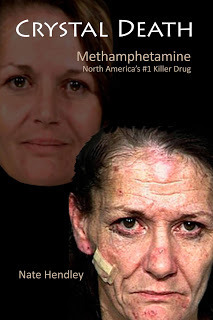
Why publish more revised reprints? Quite simple. We believed in the authors and the books. In Nate Hendley's case, we felt certain the book on crystal meth, given the right guidance regarding revision and expansion, would not only appeal to those interested in learning about the drug and reading about its horrors, but serve as educational material for drug clinics, rehabilitation centres, schools, parents, counsellors and so forth.
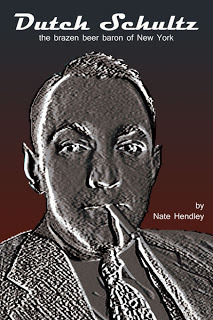
The biography of Dutch Schultz seemed a natural pairing for the Al Capone book published the previous year, and that supposition has proved accurate.
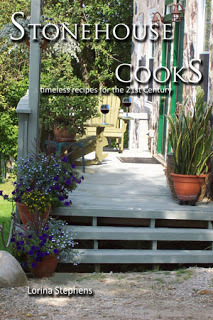
Also that year we released my own cookbook, Stonehouse Cooks, which was meant to appeal to the ordinary, everyday cook, with a few quirks and surprises thrown in for good measure, borrowing on the appeal of the successful series, Company's Coming. We also thought it would make an excellent companion book for Lima's The Organic Home Garden.
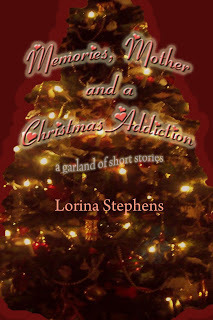
We also released an eBook only version of my trio of Rockwell-esque, seasonal short stories: Memories, Mother and a Christmas Addiction. Our thinking was it would appeal to those who keep the tradition of reading Christmas stories to family and friends on Christmas Eve (as our family used to do), and offer up a hopeful, historical view of Christmas during the dark days of the Depression Era.


Patrick Lima approached me late in 2010, wondering if I'd be interested in publishing a revised version of his orphaned book. It had originally been published by Camden House, distributed by Firefly, in 2004. Around about that time there was what has come to be known as publigedon, that is the meltdown and morphing of the publishing industry. Camden House was a casualty of that changing dynamic of publishing, and Lima found his book remaindered, out of print, and orphaned.
Given Patrick's well-known reputation as a knowledgeable organic gardener, his highly readable style, and his impeccably researched material, it was pretty much a no-brainer to offer him a publishing contract. In this case the decision was made between Robert Runte (editor of the book) and me to allow Patrick latitude to expand the book, make it into what he'd always hoped it would be, and to give creative license to his partner, John Scanlan, by way of original art and photographic images.
Together we hoped to create a book that would stand out from the wall of perfect-photograph-covers, and thus was born Scanlan's wonderfully quirky cover.
That same year we published two more of Nate Hendley's orphaned books: Crystal Death: North America's Most Dangerous Drug, and Dutch Schultz: the Brazen Beer Baron of New York.

Why publish more revised reprints? Quite simple. We believed in the authors and the books. In Nate Hendley's case, we felt certain the book on crystal meth, given the right guidance regarding revision and expansion, would not only appeal to those interested in learning about the drug and reading about its horrors, but serve as educational material for drug clinics, rehabilitation centres, schools, parents, counsellors and so forth.

The biography of Dutch Schultz seemed a natural pairing for the Al Capone book published the previous year, and that supposition has proved accurate.

Also that year we released my own cookbook, Stonehouse Cooks, which was meant to appeal to the ordinary, everyday cook, with a few quirks and surprises thrown in for good measure, borrowing on the appeal of the successful series, Company's Coming. We also thought it would make an excellent companion book for Lima's The Organic Home Garden.

We also released an eBook only version of my trio of Rockwell-esque, seasonal short stories: Memories, Mother and a Christmas Addiction. Our thinking was it would appeal to those who keep the tradition of reading Christmas stories to family and friends on Christmas Eve (as our family used to do), and offer up a hopeful, historical view of Christmas during the dark days of the Depression Era.

Published on August 26, 2013 07:29
August 21, 2013
Why We Published: the Books of 2010
By 2010 Five Rivers was beginning to solicit the interest of a few more authors. Late in 2009 I was approached by Nate Hendley who had a shelf full of orphaned titles, and he wondered if I'd be interested in giving life to any of them.
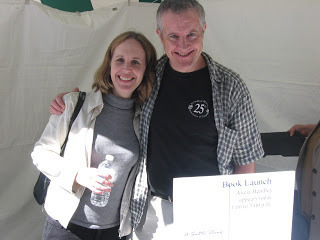
Nate Hendley (right) with his sister, Alicia Hendley (left)
at Word on the Street, Toronto, 2010.
I have to say right from the outset I was impressed with Nate Hendley. He presented himself as a complete professional, easy to get along with, well-researched, a conversational and readable style that could take the driest information and turn it into something interesting without necessity of embellishment.
Among other titles he offered us, we published in 2010, Motivate to Create, and Al Capone: Chicago's King of Crime.
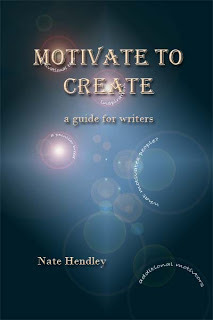
Motivate to Create is a sensible approach to fueling motivation for writers, covering both the pragmatic details of organizing your work space, to preparing to interview subjects, doing research, and even keeping the body trim to nourish the brain. I liked the way Hendley laid this out, and although the book would have a niche market, I was willing to take a risk with it.
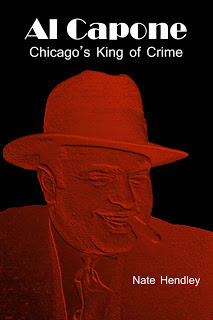
Al Capone: Chicago's King of Crime, was a biography I felt sure would do well. Why? Not only had Nate written a highly interesting and factual biography, but had managed to condense the salient points of Capone's nefarious and famous life into a compact, affordable overview for readers who didn't want to wade into a 1000 page tome. The Capone book was to become our best-selling book, with over 1200 copies sold worldwide since its revision and release. It remains a book in which I believe. And because of the way Nate Hendley handled himself through revisions, launches and his sense of teamwork with Five Rivers, it is likely I'd give anything he'd propose serious consideration.
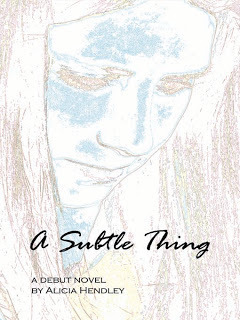
It was through Nate Hendley I was introduced to his sister, Alicia Hendley, who had written a raw, fascinating and powerful first novel, A Subtle Thing. While the original manuscript required some revision, overall I was very impressed with Alicia's ability to deal with the topic of clinical depression and weave a compelling story, and believable characters, into a story that has gone on to touch many lives, and remains, for me, a novel I'm very proud to have published.


Nate Hendley (right) with his sister, Alicia Hendley (left)
at Word on the Street, Toronto, 2010.
I have to say right from the outset I was impressed with Nate Hendley. He presented himself as a complete professional, easy to get along with, well-researched, a conversational and readable style that could take the driest information and turn it into something interesting without necessity of embellishment.
Among other titles he offered us, we published in 2010, Motivate to Create, and Al Capone: Chicago's King of Crime.

Motivate to Create is a sensible approach to fueling motivation for writers, covering both the pragmatic details of organizing your work space, to preparing to interview subjects, doing research, and even keeping the body trim to nourish the brain. I liked the way Hendley laid this out, and although the book would have a niche market, I was willing to take a risk with it.

Al Capone: Chicago's King of Crime, was a biography I felt sure would do well. Why? Not only had Nate written a highly interesting and factual biography, but had managed to condense the salient points of Capone's nefarious and famous life into a compact, affordable overview for readers who didn't want to wade into a 1000 page tome. The Capone book was to become our best-selling book, with over 1200 copies sold worldwide since its revision and release. It remains a book in which I believe. And because of the way Nate Hendley handled himself through revisions, launches and his sense of teamwork with Five Rivers, it is likely I'd give anything he'd propose serious consideration.

It was through Nate Hendley I was introduced to his sister, Alicia Hendley, who had written a raw, fascinating and powerful first novel, A Subtle Thing. While the original manuscript required some revision, overall I was very impressed with Alicia's ability to deal with the topic of clinical depression and weave a compelling story, and believable characters, into a story that has gone on to touch many lives, and remains, for me, a novel I'm very proud to have published.

Published on August 21, 2013 03:00
August 19, 2013
Errors, from the desk of Robert Runte
Had an urgent email today from an author who had awakened in the middle of the night with the nagging feeling there was something wrong with the manuscript we'd just sent off to the publisher. The author had started work on the sequel and couldn't remember whether one of the minor (i.e., non-speaking, almost entirely off-stage) characters was the King's sister or daughter. So went to check the manuscript and found that the character was sometimes referred to as the sister, and sometimes as the daughter; in one glaring example, even in the same paragraph.
Oops.
That, of course, is exactly the kind of error editors are supposed to catch. I hadn't. Worse, when I went to correct the error, had to be reminded by the author I'd also have to change "brother-in-law" to "son-in-law" throughout.

Face:Palm
Why I hadn't caught that, I'll never know. Lack of sleep, I suppose, or rushing, or my faith that this was one of those very few authors who didn't make mistakes. (Also, author's spouse is incredibly good copy editor, so usually submission is pretty clean before it leaves the author's hands.) But still, I'm pretty embarrassed.
Fortunately, we caught it before it went to layout (i.e., typesetting). Would like to think it would have been caught at the Galley stage anyway, but the sooner one can eliminate errors, the better.
Of course, mistakes are inevitable. If an editor claims they never let anything slip through, they're lying.
Why there are galleys. Even when editors catch mistakes--say, notice that the spelling of a minor character is different in different parts of the book--it often turns out that was the mistake: there were two different characters with similar names. You know? So authors have to be given opportunity to read through the book one last time before it goes to press. And even then, there are always things that slip through. Usually, right there, front and centre, at any random page you first open the final published book. *Sigh*
The worst mistake I was (tangentially) involved in was back when I was working for the government as a Test Developer (i.e., test writer/editor). A Grade 12 Mathematics examination went out with one of the equations missing an exponent, which meant that there was no correct answer for that multiple-choice question. My boss was assigned to find out what went wrong, the implication being that heads were about to roll.
He traced the error back to the original manuscript, but the question wasn't why the author made a mistake (everybody makes mistakes) but why it wasn't caught in all the checks that were built into the process. The provincial exams were the most heavily reviewed and edited documents on Earth, so how did the error get through?
When my boss followed the trail of signatures, over 36 people had signed off on the document. 36 people. I was one of the Test Developers who had reviewed the test, but I pointed out that as a Social Studies guy, I had no clue about the actual math (hey, it was the advanced Grade 12 course. Calculus. I had no idea what the test was asking, let alone what the answer might be.) My job had been to just proof for format and so on. It had checked out on that. But even allowing that some of the reviewers were checking for other stuff, it's still astounding that with over 25-30 people actually checking for content, no one caught such an obvious error.
After much hand-wringing and discussion of how to rectify for future, management cut the number of people reviewing the examination to five; one each at each distinct step. Because it turned out with 36 people, each reviewer was subconsciously thinking, "I can do this fast because if there was anything, one of the others would have caught it by now." No one could be held responsible because there were too many people to share the blame. But with five checks, one at each stage, someone was specifically responsible for it being perfect at that stage. Actually turned out to work a lot better. Another example of less is more.
So the moral here is, it's better if your editor starts from the assumption that you're an idiot. That way, they'll check everything with obsessive care. Thinking you might actually know something about punctuation, Canadian spelling, consistency and so on just leads to errors.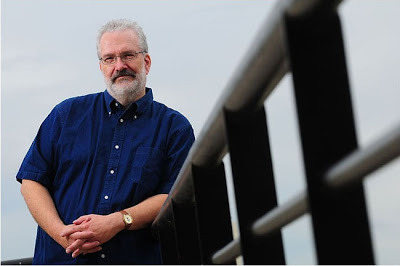

Oops.
That, of course, is exactly the kind of error editors are supposed to catch. I hadn't. Worse, when I went to correct the error, had to be reminded by the author I'd also have to change "brother-in-law" to "son-in-law" throughout.

Face:Palm
Why I hadn't caught that, I'll never know. Lack of sleep, I suppose, or rushing, or my faith that this was one of those very few authors who didn't make mistakes. (Also, author's spouse is incredibly good copy editor, so usually submission is pretty clean before it leaves the author's hands.) But still, I'm pretty embarrassed.
Fortunately, we caught it before it went to layout (i.e., typesetting). Would like to think it would have been caught at the Galley stage anyway, but the sooner one can eliminate errors, the better.
Of course, mistakes are inevitable. If an editor claims they never let anything slip through, they're lying.
Why there are galleys. Even when editors catch mistakes--say, notice that the spelling of a minor character is different in different parts of the book--it often turns out that was the mistake: there were two different characters with similar names. You know? So authors have to be given opportunity to read through the book one last time before it goes to press. And even then, there are always things that slip through. Usually, right there, front and centre, at any random page you first open the final published book. *Sigh*
The worst mistake I was (tangentially) involved in was back when I was working for the government as a Test Developer (i.e., test writer/editor). A Grade 12 Mathematics examination went out with one of the equations missing an exponent, which meant that there was no correct answer for that multiple-choice question. My boss was assigned to find out what went wrong, the implication being that heads were about to roll.
He traced the error back to the original manuscript, but the question wasn't why the author made a mistake (everybody makes mistakes) but why it wasn't caught in all the checks that were built into the process. The provincial exams were the most heavily reviewed and edited documents on Earth, so how did the error get through?
When my boss followed the trail of signatures, over 36 people had signed off on the document. 36 people. I was one of the Test Developers who had reviewed the test, but I pointed out that as a Social Studies guy, I had no clue about the actual math (hey, it was the advanced Grade 12 course. Calculus. I had no idea what the test was asking, let alone what the answer might be.) My job had been to just proof for format and so on. It had checked out on that. But even allowing that some of the reviewers were checking for other stuff, it's still astounding that with over 25-30 people actually checking for content, no one caught such an obvious error.
After much hand-wringing and discussion of how to rectify for future, management cut the number of people reviewing the examination to five; one each at each distinct step. Because it turned out with 36 people, each reviewer was subconsciously thinking, "I can do this fast because if there was anything, one of the others would have caught it by now." No one could be held responsible because there were too many people to share the blame. But with five checks, one at each stage, someone was specifically responsible for it being perfect at that stage. Actually turned out to work a lot better. Another example of less is more.
So the moral here is, it's better if your editor starts from the assumption that you're an idiot. That way, they'll check everything with obsessive care. Thinking you might actually know something about punctuation, Canadian spelling, consistency and so on just leads to errors.


Published on August 19, 2013 03:00
August 16, 2013
Why We Published: the books of 2008 and 2009
When Five Rivers launched into publishing, it was with humble beginnings and a small catalogue, primarily my own works. It was never my intention for Five Rivers to be a vanity house, yet in those first two years we were very embryonic, soliciting manuscripts and developing our mandate, which was to be a showcase of new and established Canadian voices.
We tested the waters with:
Shadow Song, by Lorina Stephens, August 2008
And the Angels Sang, by Lorina Stephens, September 1, 2008
Elephant's Breath and London Smoke, by Deb Salisbury, February 2009
From Mountains of Ice, by Lorina Stephens, July 2009
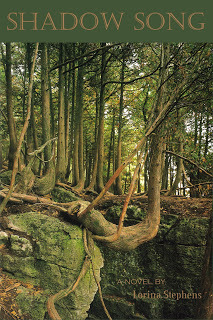
Why publish these four books? Shadow Song had been the rounds of major publishers, often garnering positive comments, but always falling just short of that illusive publishing contract, mostly, it would seem, because of its hybrid nature. I decided to venture out on my own, given there was enough response to make me believe a small house and sufficient marketing could bring in a reasonable expectation of success. Turns out that decision was sound, and while Shadow Song has not hit bestseller, it has certainly performed better than the majority of self-published books, which usually only see a maximum of 200 units sold.
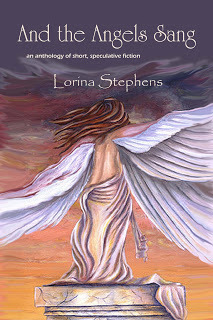
Since I'd already decided to commit the, then, sin of self-publishing, I figured I'd publish a collection of my own short stories, And the Angels Sang. If nothing else it would gain me experience in the publishing world, in all of its facets from creation to the business of distribution and accounts collection.
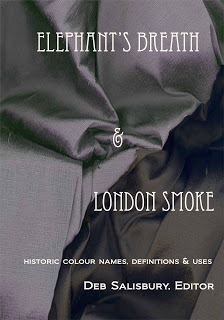
Around about that time an old colleague of mine, Deb Salisbury -- who research and created historical sewing patterns under her business, The Mantua-Maker -- told me about a dictionary of historic colour names on which she was working. That piqued my curiosity, and after several discussions with her I asked her to let me publish the book. I knew very well Elephant's Breath and London Smoke would be an ultra-niche market book. But for those who were after this kind of esoteric historical material it would be invaluable. And given my life-long penchant for ignoring the status-quo, the decision to publish the dictionary just seemed logical. It was impeccably researched, well-organized, an ease to layout and publish.
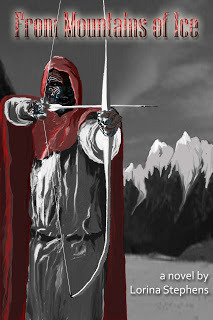
During that time I'd been working on my first new novel in many years, and by July 2009 I released Five Rivers next publication, From Mountains of Ice. It's another hybrid novel, equally dark-fantasy and historically-inspired. And I thought that when eventually we expanded our catalogue to include other authors, it would sit easily among them.
Next up, the books of 2010:
Motivate to Create, by Nate Hendley, May 2010
Al Capone: Chicago's King of Crime, by Nate Hendley, July 2010
A Subtle Thing, by Alicia Hendley, August 2010

We tested the waters with:
Shadow Song, by Lorina Stephens, August 2008
And the Angels Sang, by Lorina Stephens, September 1, 2008
Elephant's Breath and London Smoke, by Deb Salisbury, February 2009
From Mountains of Ice, by Lorina Stephens, July 2009

Why publish these four books? Shadow Song had been the rounds of major publishers, often garnering positive comments, but always falling just short of that illusive publishing contract, mostly, it would seem, because of its hybrid nature. I decided to venture out on my own, given there was enough response to make me believe a small house and sufficient marketing could bring in a reasonable expectation of success. Turns out that decision was sound, and while Shadow Song has not hit bestseller, it has certainly performed better than the majority of self-published books, which usually only see a maximum of 200 units sold.

Since I'd already decided to commit the, then, sin of self-publishing, I figured I'd publish a collection of my own short stories, And the Angels Sang. If nothing else it would gain me experience in the publishing world, in all of its facets from creation to the business of distribution and accounts collection.

Around about that time an old colleague of mine, Deb Salisbury -- who research and created historical sewing patterns under her business, The Mantua-Maker -- told me about a dictionary of historic colour names on which she was working. That piqued my curiosity, and after several discussions with her I asked her to let me publish the book. I knew very well Elephant's Breath and London Smoke would be an ultra-niche market book. But for those who were after this kind of esoteric historical material it would be invaluable. And given my life-long penchant for ignoring the status-quo, the decision to publish the dictionary just seemed logical. It was impeccably researched, well-organized, an ease to layout and publish.

During that time I'd been working on my first new novel in many years, and by July 2009 I released Five Rivers next publication, From Mountains of Ice. It's another hybrid novel, equally dark-fantasy and historically-inspired. And I thought that when eventually we expanded our catalogue to include other authors, it would sit easily among them.
Next up, the books of 2010:
Motivate to Create, by Nate Hendley, May 2010
Al Capone: Chicago's King of Crime, by Nate Hendley, July 2010
A Subtle Thing, by Alicia Hendley, August 2010

Published on August 16, 2013 03:00
August 14, 2013
An interview with Sally McBride, author of Indigo Time
We recently sat down virtually with Sally McBride, author of the newly released speculative fiction novel, Indigo Time, and discussed her muse, her work ethic, her views on publishing and process. We think you'll enjoy this frank, unpretentious author.
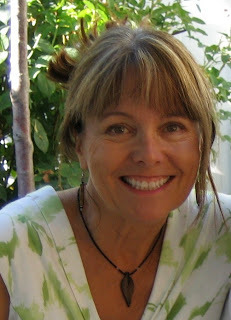
Sally McBride
Q: There is a depth of environment, cultural construct and history to Indigo Time. Tell us about that genesis and growth, please. Was it epiphany, or the result of much thought and careful building?
McBride: Thank you! I would have liked to stuff a whole lot more cultural, geographic and historical detail into the book…but it would have run quite a few more pages! I pictured the world of Strand (called that by those unwillingly stranded there) as similar to Earth in many ways, but with slightly lower gravity, perhaps due to a different, lighter core composition. Thus the mountains are higher and steeper, environmental changes more sudden, etc. (Since I have little scientific training and a deplorable lack of focus, the world does not have rigorously researched veracity. My bad.)
The society that grows there over time stems from its start in a resentful, spoiled and panicky group of nobles and their servants. Basically I dumped them there and let them do their thing for 300 years, at which point my story starts. I did a few calculations to see just how quickly the population would grow…turns out quite fast, if you picture humans taking a look at a big empty world with no one telling them not to go forth and multiply, plus a pent-up desire for freedom. Since my ‘galactic empire’ is advanced, though rather decadent, I made my people free of most handicaps and relatively immune to illness.
As a matter of fact, I spent very little time thinking about world-building. The world is just a backdrop for the characters and their interlocking stories. I wanted it to be beautiful, accessible and just a wee bit harsh, but nothing that would make the story be about the world and not the people in it.
Q: To categorize Indigo Time might prove problematic for those who prefer clear labels. Does that bother you – that you’re writing hybrid stories? Or is that never a consideration and you simply write what you wish?
McBride: It does sort of bother me. Indigo Time is technically science fiction (space-faring empire, genetic engineering) but reads more like fantasy (primitive ‘medieval-style’ civilization, psychic powers). Or it might be Young Adult. So where does it go on the shelf? If a reader is looking for sci-fi they might pass it up thinking it’s fantasy, and vice-versa. Indigo Time started years ago as a short story about lovers torn apart, but morphed into a coming-of-age tale alongside a coming-to-love story. With an evil old woman stirring the pot. Several generations each have their own jobs to do in the novel. I tend to hope that readers will mentally place it alongside some of Anne McCaffrey’s Pern novels, which I think have a similar flavour.

I’m not quite sure what to do about my tendency to write hybrids. Or if I should do anything at all. Since I’m in a happy position of not having to try to make a living at writing, I can just do as I want. Lucky me!
Of course there are lots of folks who love the whole spectrum of speculative fiction…hopefully they will take a look.
Q: Do you think there’s a caveat in being branded by way of genre, or not?
McBride: Depends on how wide and inclusive the genre is. Speculative fiction covers a lot of ground. Saying “I write steampunk,” or, “I write dystopian hard sf,” implying that’s all you are interested in, that’s restrictive. I hate to think the bookshelves will become more and more Balkanized and readers will head only to their little section to seek out more of the same. However, if you’re trying to establish a reputation and hopefully get on with an agent, or noticed by a large publishing house, it’s undoubtedly much better to find your niche and develop it. Branding is very big in Romance writing, for instance. People buy an author, not a book. If I like a writer’s style and the stories they tell, I’ll seek out more by that person, and I admit I might cast a suspicious eye on something outside of the genre I’ve grown accustomed to seeing them write.
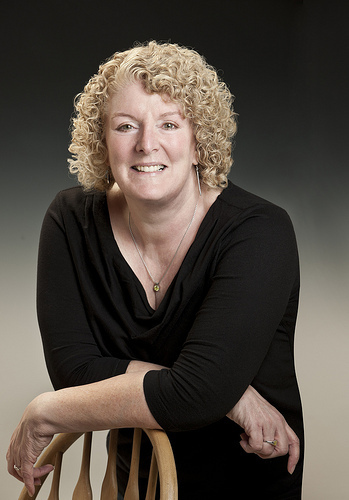
Dana Stabenow
For instance, one of my favourite writers is Dana Stabenow, who writes terrific mysteries set in Alaska. She has also written a few science fiction novels, but I’m leery of trying them. Why? Do I not trust her talents to encompass more than one genre? I’m accustomed to hearing her tell a certain kind of story. I like it, and don’t fancy having to become all judgmental about whether she can also do sf. For it’s true—people judge. A certain well-known and very accomplished literary writer tried her hand at science fiction and was criticized for sashaying into territory where she wasn’t quite welcome. It was perceived that she hadn’t paid her dues in the sf world. Perhaps she was indeed an interloper, or perhaps she simply didn’t care and chose to write whatever she damned well pleased. At a certain level, a well-beloved or admired author can do anything he or she wants and it will get serious attention. But when you’re just starting out, or are stuck in the mid-list? Better probably to make the decision: am I in this for love or money?
Q: I think all of us are asked this at some point, about our writing process, about where we write, the environment we create for ourselves, the rituals, beverages, twitches, avoidances, compulsions. What are yours?
McBride: I’m lucky enough to have ‘a room of my own’ where I can retreat and focus. Or try to focus…. Hmm, doesn’t that bathroom need a good cleaning? And I think I need milk and eggs…. Is that my cat wanting in/out? Etc. It can take me a while to settle down and stop finding new avoidance techniques. Sometimes I get in the zone and the words come easily, sometimes not so much. I don’t listen to music while I write, though I know a lot of people who need certain kinds of noise in the background, including coffee-shop chatter, TV in background, that sort of thing.
At one time I had a particularly boring day job, and I got a lot of writing done then. But mostly it was at home in the evenings, and the pressure of having to go to work in the morning made writing time more precious. Now I think of myself as ‘retired’ and it can be hard to force myself into a productive routine. I do the physical stuff, housework, errands, gym and so on in the mornings, then write in the afternoons and late evenings.

I used to start my stories in longhand, then transcribe them to typewriter (yep, quite a while ago…) but now I just jump right in on my PC. I’ve taken a look at software for writers but find it’s just not for me. I jot notes on paper, or in a computer file. When I start a story or novel it’s usually with just a compelling (to me) opening scene or glimpse or even a phrase. I’ll write a few paragraphs to see if the idea starts to expand in my head. If it does, and seems to have potential to grow into a novel-length work, I start to generate scenes that I know I’d like to put into the novel. They can be from anywhere in the story. I generate them as fast and loosely as I can, toss them in no particular order into a ‘scenes’ file, and check them off when they’ve served their purpose. Which is: they work in the book or they don’t. If they don’t I chuck them. You have to be quite ruthless.
Q: Why choose to go with a small publisher like Five Rivers? Why not target larger houses?
McBride: As I tell up-and-coming writers, it doesn’t hurt to take a shot at the big-name publishing houses, bearing in mind that they get more submissions than they can possibly handle. What’s the harm in taking a run at a major player? Just be sure your work is really ready to be seen.
But unless you have great luck, or some kind of in, your manuscript will probably languish in the slush pile for a dismayingly long time. A new, unknown writer is likely to get lost in the crowd, and if taken on, might get shunted to one side in favour of more established names. At a smaller publisher, you stand a good chance of real attention from an editor, plus genuine knowledge and interest in the marketplace. That’s what I have found with Five Rivers. Indigo Time became a better book because of the relentless hounding…er, I mean the brilliant suggestions of my editor Robert Runté.
Q: Tell us something about how it is Sally McBride came to the literary muse.
McBride: I love to read. I discovered science fiction as a young mother and tried writing it after my own mom (a poet) said she thought I had a facility with words. I’m sad to report that my first effort was a shameless bit of Star Trek fan fiction, which shall remain in the bottom drawer forever.
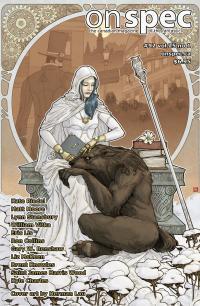
I got more serious about techniques of writing, and eventually produced a few short stories. My first sale was to the amazing Judith Merril, for her Tesseracts anthology. I was delighted to be in the company of such folks as William Gibson, Phyllis Gotlieb, and Spider Robinson, and I floated above the Earth for a while. I’ve sold almost every short story I’ve written, to magazines and anthologies such as Asimov’s, Realms of Fantasy, Northern Frights, On Spec, Matrix and lots more. My paranormal romance novel Remnants of Fear came out from The Wild Rose Press a while ago, but it sank with barely a trace. Another paranormal, Water, Circle, Moon has recently been released by Masque Books. I’m concentrating on novels these days, as short fiction ideas are quite different and don’t seem to be popping up the way they used to.
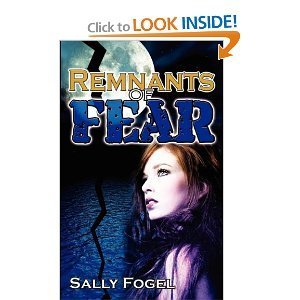
Q: Over the past year or so there has been much in publishing trade magazines about women being under-represented, and unrecognized especially when it comes to literary awards. What are your thoughts on that debate?
McBride: It’s something I really haven’t thought about. It seems to be a constant and recurring issue over the years; I do believe that some of the very best sf/f/h writing has been done, and is still being done, by women. And the men, bless their hearts, seem to be pretty damn good too. There may be an ‘old boys’ network’ that skews awards towards the men, but I don’t know enough about this to comment on it.
Q: Do you consciously write as a woman, or is gender a non-issue for you?
McBride: Gender is pretty much a non-issue. I like writing in the female and the male voice, also the young and the old, the alien and the human. My gender is always there, of course, along with its attendant baggage, but I do like writing male characters. I know lots of men, like most of them and can see where they are coming from most of the time. I feel that I can, and should, tell a story using whatever gender of character best fits the necessities of the plot.
Q: Where from here? Is there another novel on the desk? Short stories? Screenplay?
McBride: I’m always working on multiple projects. I have a fantasy novel (The Nightingale’s Tooth) on the go that I just love, about a young woman in training to be resura – resurrected into a realm of magic she must learn to control. Another is a science fiction novel about shape-shifter children who have been insidiously enslaved to those who love them most, and who must find the will to rebel. I’m hoping to have both these novels done in first draft by early next year.
And did you mention screenplay? Since you ask…. I had one of those high-concept ideas for a TV show that involves the supernatural, plus a woman in search of the truth about her mother’s supposed death. Sounds kind of trite when I put it that way, but it’s fun to think about, and amass a series of scenes, characters, and possible ways the story could go. I’m also writing another paranormal, set in Hawaii, about three generations of women who discover things about themselves that they really don’t like.
Q: What advice would you give to an aspiring author?
McBride: My biggest advice is to read. A lot. Everything you can get your hands on. Try not to get too attached to one genre; branch out into non-fiction, literary, YA, whatever looks interesting to you. I have a suspicion that creative writing courses aren’t worth the time and money, but that’s just my experience.

If you really think you’d like to try your hand at writing, you will have to put down that book you’re reading, take a deep breath, sit down at the computer (or the kitchen table with a pad of paper, or whatever works for you) and start in. Write a sentence. Write more sentences. Delete stuff that seems to be going nowhere. Look at things sideways. Ask “What if?” Put your hero or heroine into a dreadful situation and work with them to get out of it. Trust your subconscious mind to be there for you. Sleep on stuff. Try to remember your dreams. Be ready and open to catch that inspired thought, that plot twist, that lovely turn of phrase. Get it down or it will get lost in the noise of everyday life. Finish something, even if it’s just a short scene. Remember that a story has a beginning, a middle and an end, and sometimes the end is hard to find.
If you keep writing, you will get better at it. If you get good enough and can find the nerve to submit your work to an honest-to-god publisher or agent, you will most likely see your name in print someday. And you will float above the surface of the Earth.
Indigo Time is available through online booksellers worldwide in both print and eBook, and directly from Five Rivers.
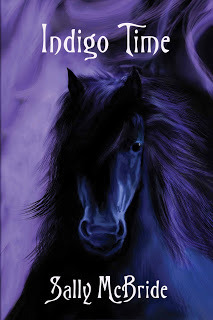
ISBN 9781927400319 $24.99
eISBN 9781927400326 $4.99
by Sally McBride
Trade paperback 6 x 9, 302 pages
ePUB format
August 1, 2013
Format
Print $24.99 CAD
eBook $4.99 CAD



Sally McBride
Q: There is a depth of environment, cultural construct and history to Indigo Time. Tell us about that genesis and growth, please. Was it epiphany, or the result of much thought and careful building?
McBride: Thank you! I would have liked to stuff a whole lot more cultural, geographic and historical detail into the book…but it would have run quite a few more pages! I pictured the world of Strand (called that by those unwillingly stranded there) as similar to Earth in many ways, but with slightly lower gravity, perhaps due to a different, lighter core composition. Thus the mountains are higher and steeper, environmental changes more sudden, etc. (Since I have little scientific training and a deplorable lack of focus, the world does not have rigorously researched veracity. My bad.)
The society that grows there over time stems from its start in a resentful, spoiled and panicky group of nobles and their servants. Basically I dumped them there and let them do their thing for 300 years, at which point my story starts. I did a few calculations to see just how quickly the population would grow…turns out quite fast, if you picture humans taking a look at a big empty world with no one telling them not to go forth and multiply, plus a pent-up desire for freedom. Since my ‘galactic empire’ is advanced, though rather decadent, I made my people free of most handicaps and relatively immune to illness.
As a matter of fact, I spent very little time thinking about world-building. The world is just a backdrop for the characters and their interlocking stories. I wanted it to be beautiful, accessible and just a wee bit harsh, but nothing that would make the story be about the world and not the people in it.
Q: To categorize Indigo Time might prove problematic for those who prefer clear labels. Does that bother you – that you’re writing hybrid stories? Or is that never a consideration and you simply write what you wish?
McBride: It does sort of bother me. Indigo Time is technically science fiction (space-faring empire, genetic engineering) but reads more like fantasy (primitive ‘medieval-style’ civilization, psychic powers). Or it might be Young Adult. So where does it go on the shelf? If a reader is looking for sci-fi they might pass it up thinking it’s fantasy, and vice-versa. Indigo Time started years ago as a short story about lovers torn apart, but morphed into a coming-of-age tale alongside a coming-to-love story. With an evil old woman stirring the pot. Several generations each have their own jobs to do in the novel. I tend to hope that readers will mentally place it alongside some of Anne McCaffrey’s Pern novels, which I think have a similar flavour.

I’m not quite sure what to do about my tendency to write hybrids. Or if I should do anything at all. Since I’m in a happy position of not having to try to make a living at writing, I can just do as I want. Lucky me!
Of course there are lots of folks who love the whole spectrum of speculative fiction…hopefully they will take a look.
Q: Do you think there’s a caveat in being branded by way of genre, or not?
McBride: Depends on how wide and inclusive the genre is. Speculative fiction covers a lot of ground. Saying “I write steampunk,” or, “I write dystopian hard sf,” implying that’s all you are interested in, that’s restrictive. I hate to think the bookshelves will become more and more Balkanized and readers will head only to their little section to seek out more of the same. However, if you’re trying to establish a reputation and hopefully get on with an agent, or noticed by a large publishing house, it’s undoubtedly much better to find your niche and develop it. Branding is very big in Romance writing, for instance. People buy an author, not a book. If I like a writer’s style and the stories they tell, I’ll seek out more by that person, and I admit I might cast a suspicious eye on something outside of the genre I’ve grown accustomed to seeing them write.

Dana Stabenow
For instance, one of my favourite writers is Dana Stabenow, who writes terrific mysteries set in Alaska. She has also written a few science fiction novels, but I’m leery of trying them. Why? Do I not trust her talents to encompass more than one genre? I’m accustomed to hearing her tell a certain kind of story. I like it, and don’t fancy having to become all judgmental about whether she can also do sf. For it’s true—people judge. A certain well-known and very accomplished literary writer tried her hand at science fiction and was criticized for sashaying into territory where she wasn’t quite welcome. It was perceived that she hadn’t paid her dues in the sf world. Perhaps she was indeed an interloper, or perhaps she simply didn’t care and chose to write whatever she damned well pleased. At a certain level, a well-beloved or admired author can do anything he or she wants and it will get serious attention. But when you’re just starting out, or are stuck in the mid-list? Better probably to make the decision: am I in this for love or money?
Q: I think all of us are asked this at some point, about our writing process, about where we write, the environment we create for ourselves, the rituals, beverages, twitches, avoidances, compulsions. What are yours?
McBride: I’m lucky enough to have ‘a room of my own’ where I can retreat and focus. Or try to focus…. Hmm, doesn’t that bathroom need a good cleaning? And I think I need milk and eggs…. Is that my cat wanting in/out? Etc. It can take me a while to settle down and stop finding new avoidance techniques. Sometimes I get in the zone and the words come easily, sometimes not so much. I don’t listen to music while I write, though I know a lot of people who need certain kinds of noise in the background, including coffee-shop chatter, TV in background, that sort of thing.
At one time I had a particularly boring day job, and I got a lot of writing done then. But mostly it was at home in the evenings, and the pressure of having to go to work in the morning made writing time more precious. Now I think of myself as ‘retired’ and it can be hard to force myself into a productive routine. I do the physical stuff, housework, errands, gym and so on in the mornings, then write in the afternoons and late evenings.

I used to start my stories in longhand, then transcribe them to typewriter (yep, quite a while ago…) but now I just jump right in on my PC. I’ve taken a look at software for writers but find it’s just not for me. I jot notes on paper, or in a computer file. When I start a story or novel it’s usually with just a compelling (to me) opening scene or glimpse or even a phrase. I’ll write a few paragraphs to see if the idea starts to expand in my head. If it does, and seems to have potential to grow into a novel-length work, I start to generate scenes that I know I’d like to put into the novel. They can be from anywhere in the story. I generate them as fast and loosely as I can, toss them in no particular order into a ‘scenes’ file, and check them off when they’ve served their purpose. Which is: they work in the book or they don’t. If they don’t I chuck them. You have to be quite ruthless.
Q: Why choose to go with a small publisher like Five Rivers? Why not target larger houses?
McBride: As I tell up-and-coming writers, it doesn’t hurt to take a shot at the big-name publishing houses, bearing in mind that they get more submissions than they can possibly handle. What’s the harm in taking a run at a major player? Just be sure your work is really ready to be seen.
But unless you have great luck, or some kind of in, your manuscript will probably languish in the slush pile for a dismayingly long time. A new, unknown writer is likely to get lost in the crowd, and if taken on, might get shunted to one side in favour of more established names. At a smaller publisher, you stand a good chance of real attention from an editor, plus genuine knowledge and interest in the marketplace. That’s what I have found with Five Rivers. Indigo Time became a better book because of the relentless hounding…er, I mean the brilliant suggestions of my editor Robert Runté.
Q: Tell us something about how it is Sally McBride came to the literary muse.
McBride: I love to read. I discovered science fiction as a young mother and tried writing it after my own mom (a poet) said she thought I had a facility with words. I’m sad to report that my first effort was a shameless bit of Star Trek fan fiction, which shall remain in the bottom drawer forever.

I got more serious about techniques of writing, and eventually produced a few short stories. My first sale was to the amazing Judith Merril, for her Tesseracts anthology. I was delighted to be in the company of such folks as William Gibson, Phyllis Gotlieb, and Spider Robinson, and I floated above the Earth for a while. I’ve sold almost every short story I’ve written, to magazines and anthologies such as Asimov’s, Realms of Fantasy, Northern Frights, On Spec, Matrix and lots more. My paranormal romance novel Remnants of Fear came out from The Wild Rose Press a while ago, but it sank with barely a trace. Another paranormal, Water, Circle, Moon has recently been released by Masque Books. I’m concentrating on novels these days, as short fiction ideas are quite different and don’t seem to be popping up the way they used to.

Q: Over the past year or so there has been much in publishing trade magazines about women being under-represented, and unrecognized especially when it comes to literary awards. What are your thoughts on that debate?
McBride: It’s something I really haven’t thought about. It seems to be a constant and recurring issue over the years; I do believe that some of the very best sf/f/h writing has been done, and is still being done, by women. And the men, bless their hearts, seem to be pretty damn good too. There may be an ‘old boys’ network’ that skews awards towards the men, but I don’t know enough about this to comment on it.
Q: Do you consciously write as a woman, or is gender a non-issue for you?
McBride: Gender is pretty much a non-issue. I like writing in the female and the male voice, also the young and the old, the alien and the human. My gender is always there, of course, along with its attendant baggage, but I do like writing male characters. I know lots of men, like most of them and can see where they are coming from most of the time. I feel that I can, and should, tell a story using whatever gender of character best fits the necessities of the plot.
Q: Where from here? Is there another novel on the desk? Short stories? Screenplay?
McBride: I’m always working on multiple projects. I have a fantasy novel (The Nightingale’s Tooth) on the go that I just love, about a young woman in training to be resura – resurrected into a realm of magic she must learn to control. Another is a science fiction novel about shape-shifter children who have been insidiously enslaved to those who love them most, and who must find the will to rebel. I’m hoping to have both these novels done in first draft by early next year.
And did you mention screenplay? Since you ask…. I had one of those high-concept ideas for a TV show that involves the supernatural, plus a woman in search of the truth about her mother’s supposed death. Sounds kind of trite when I put it that way, but it’s fun to think about, and amass a series of scenes, characters, and possible ways the story could go. I’m also writing another paranormal, set in Hawaii, about three generations of women who discover things about themselves that they really don’t like.
Q: What advice would you give to an aspiring author?
McBride: My biggest advice is to read. A lot. Everything you can get your hands on. Try not to get too attached to one genre; branch out into non-fiction, literary, YA, whatever looks interesting to you. I have a suspicion that creative writing courses aren’t worth the time and money, but that’s just my experience.

If you really think you’d like to try your hand at writing, you will have to put down that book you’re reading, take a deep breath, sit down at the computer (or the kitchen table with a pad of paper, or whatever works for you) and start in. Write a sentence. Write more sentences. Delete stuff that seems to be going nowhere. Look at things sideways. Ask “What if?” Put your hero or heroine into a dreadful situation and work with them to get out of it. Trust your subconscious mind to be there for you. Sleep on stuff. Try to remember your dreams. Be ready and open to catch that inspired thought, that plot twist, that lovely turn of phrase. Get it down or it will get lost in the noise of everyday life. Finish something, even if it’s just a short scene. Remember that a story has a beginning, a middle and an end, and sometimes the end is hard to find.
If you keep writing, you will get better at it. If you get good enough and can find the nerve to submit your work to an honest-to-god publisher or agent, you will most likely see your name in print someday. And you will float above the surface of the Earth.
Indigo Time is available through online booksellers worldwide in both print and eBook, and directly from Five Rivers.

ISBN 9781927400319 $24.99
eISBN 9781927400326 $4.99
by Sally McBride
Trade paperback 6 x 9, 302 pages
ePUB format
August 1, 2013
Format
Print $24.99 CAD
eBook $4.99 CAD


Published on August 14, 2013 03:00
August 12, 2013
MacGregor posts preview of first two chapters
Susan MacGregor, author of The Tattooed Witch, has posted a preview of the first two chapters of her new, debut novel over on her blog at Suzenyms. Definitely worth taking a look.
The Tattooed Witch is now available in print and eBook from all major online retailers globally, as well as directly from Five Rivers. Just check out our Catalogue.

The Tattooed Witch is now available in print and eBook from all major online retailers globally, as well as directly from Five Rivers. Just check out our Catalogue.

Published on August 12, 2013 03:00

